Feature Articles - The Balkan Causes of World War One
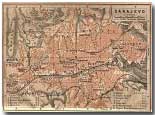 Contents:
Contents:
Focussing
on the Balkans
The Purpose of the Murder Itself
Serbian Blame: The Assassins
Serbian Blame: The Black Hand
Serbian Blame: Pasic and the State
Blame in
Austria-Hungary
The Serb Reply
Why a Balkan War?
Few issues in modern history have received as much attention as assigning blame for the outbreak of the World War in 1914. The debate began during the war itself as each side tried to lay blame on the other, became part of the "war guilt" question after 1918, went through a phase of revisionism in the 1920s, and was revived in the 1960s thanks to the work of Fritz Fischer.
This lecture also deals with the causes of World War I, but does so from a Balkan perspective. Certainly Great Power tensions were widespread in 1914, and those tensions caused the rapid spread of the war after it broke out, but many previous Great Power crises had been resolved without war. Why did this particular episode, a Balkan crisis that began with a political murder in Bosnia, prove so unmanageable and dangerous?
Some questions will help to frame our inquiry:
-
What was the purpose of
the assassination of Franz Ferdinand in Sarajevo on June 28, 1914?
-
Who was responsible for
the killing, besides the assassins themselves?
-
Was a war inevitable
after the murder, or did policy-makers let the crisis escape control?
- Finally, why did a Balkan crisis lead to a world war in 1914, when other crises had not?
Focussing on the Balkans
From a Balkan perspective, it is crucial to look at the actors and decision-makers who were at work during the conflict between Austria-Hungary and Serbia, the two states involved in the original Sarajevo crisis. Doing so highlights factors that are somewhat different from those at work among the Great Powers at large, or those cited in general explanations for the war.
General treatments of the European crisis of 1914 often blame Great Power statesmen for their short-sightedness, incompetence, or failure to act in a timely or effective way to keep the peace. A common theme is the passive nature of Great Power policy: leaders reacted to events instead of proactively managing the crisis. With some justification, scholars conclude that French leaders had little choice: France was the object of a German invasion.
England in turn entered the war because a successful German attack on France and Belgium would have made Germany too powerful. Both Germany and Russia mobilized their armies in haste, because each one feared defeat by powerful enemies if they delayed. Germany and Russia also rashly committed themselves to support Balkan clients - Austria-Hungary and Serbia, respectively - because Berlin and St. Petersburg feared that failure to do so would cost them the trust of important allies and leave them isolated. This view treats Balkan matters largely as influences on policy elsewhere.
An analysis rooted in a Balkan perspective, on the other hand, can evaluate the proactive steps taken in the region from the start of the crisis. Unfortunately, when Austrians, Hungarians, and Serbs made important decisions early in the crisis, they consistently avoided compromise and risked war.
Two months passed between the murder of Franz Ferdinand, heir to the throne of Austria-Hungary, by a Bosnian Serb high school student on June 28, and the coming of general war at the end of August. In other words, there was plenty of time for calculation, caution and decision. Who chose to risk war, and why?
The Purpose of the Murder Itself
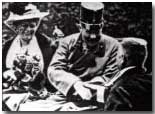 The
murder itself was hardly a mystery. There were scores of witnesses and
the killers were immediately arrested: we even have a photograph of Gavrilo
Princip being wrestled to the ground by police.
The
murder itself was hardly a mystery. There were scores of witnesses and
the killers were immediately arrested: we even have a photograph of Gavrilo
Princip being wrestled to the ground by police.
The conspirators willingly confessed: transcripts of their trial statements have been published. Nor was the fact of murder per se crucial. It was an age of assassins: Franz Joseph's wife, the Empress Elizabeth, had been murdered in 1898 in Switzerland by an Italian, but Austria did not seek war with Italy or Switzerland. It was the significance of this particular crime for Austro-Serbian relations that mattered.
Serbian Blame: The Assassins
To assess the degree of Serbian guilt, we should look in three places: the young Bosnian assassins, their backers in Serbia, and the Serbian government.
Franz Ferdinand, his wife Sophie Chotek, and Governor Potiorek (in an open car) passed seven assassins as their procession drove through Sarajevo. A look at the actual participants tells us something about South Slav nationalist dissatisfaction in Habsburg-ruled Bosnia.
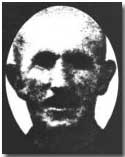 The first conspirator along
the parade route was Mehmed Mehmedbasic, a 27-year old carpenter, son of an
impoverished Bosnian Muslim notable: he had a bomb. After planning a plot of
his own to kill Governor Potiorek, Mehmedbasic joined the larger plot.
The first conspirator along
the parade route was Mehmed Mehmedbasic, a 27-year old carpenter, son of an
impoverished Bosnian Muslim notable: he had a bomb. After planning a plot of
his own to kill Governor Potiorek, Mehmedbasic joined the larger plot.
When the car passed him, he did nothing: a gendarme stood close by, and Mehmedbasic feared that a botched attempt might spoil the chance for the others. He was the only one of the assassins to escape.
Next was Vaso Cubrilovic, a 17-year old student armed with a revolver. Cubrilovic was recruited for the plot during a political discussion: in Bosnia in 1914, virtual strangers might plot political murders, if they shared radical interests. Cubrilovic had been expelled from the Tuzla high school for walking out on the Habsburg anthem. Cubrilovic too did nothing, afraid of shooting Duchess Sophie by accident. Under Austrian law, there was no death penalty for juvenile offenders, so Cubrilovic was sentenced to 16 years. In later life became a history professor.
Nedelko Cabrinovic was the third man, a 20-year old idler on bad terms with his family over his politics: he took part in strikes and read anarchist books. His father ran a cafe, did errands for the local police, and beat his family. Nedelko dropped out of school, and moved from job to job: locksmithing, operating a lathe, and setting type. In 1914 Cabrinovic worked for the Serbian state printing house in Belgrade.
He was a friend of Gavrilo Princip, who recruited him for the killing, and they travelled together back to Sarajevo. Cabrinovic threw a bomb, but failed to see the car in time to aim well: he missed the heir's car and hit the next one, injuring several people. Cabrinovic swallowed poison and jumped into a canal, but he was saved from suicide and arrested. He died of tuberculosis in prison in 1916.
The fourth and fifth plotters were standing together. One was Cvetko Popovic, an 18-year old student who seems to have lost his nerve, although he claimed not to have seen the car, being nearsighted. Popovic received a 13-year sentence, and later became a school principal.
Nearby was 24-year old Danilo Ilic, the main organizer of the plot; he had no weapon. Ilic was raised in Sarajevo by his mother, a laundress. His father was dead, and Ilic worked as a newsboy, a theatre usher, a laborer, a railway porter, a stone-worker and a longshoreman while finishing school; later he was a teacher, a bank clerk, and a nurse during the Balkan Wars. His real vocation was political agitation: he had contacts in Bosnia, with the Black Hand in Serbia, and in the exile community in Switzerland. He obtained the guns and bombs used in the plot. Ilic was executed for the crime.
The final two of the seven conspirators were farther down the road. Trifko Grabez was a 19-year old Bosnian going to school in Belgrade, where he became friends with Princip. He too did nothing: at his trial he said he was afraid of hurting some nearby women and children, and feared that an innocent friend standing with him would be arrested unjustly. He too died in prison: the Austrians spared few resources for the health of the assassins after conviction.
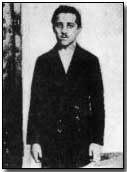 Gavrilo Princip was last. Also 19-years old, he was a student who had never held a job. His peasant
family owned a tiny farm of four acres, the remnant of a communal zadruga
broken up in the 1880s; for extra cash, his father drove a mail coach.
Gavrilo Princip was last. Also 19-years old, he was a student who had never held a job. His peasant
family owned a tiny farm of four acres, the remnant of a communal zadruga
broken up in the 1880s; for extra cash, his father drove a mail coach.
Gavrilo was sickly but smart: at 13 he went off to the Merchants Boarding School in Sarajevo. He soon turned up his nose at commerce, in favor of literature, poetry, and student politics. For his role in a demonstration, he was expelled and lost his scholarship. In 1912 he went to Belgrade: he never enrolled in school, but dabbled in literature and politics, and somehow made contact with Apis and the Black Hand. During the Balkan Wars he volunteered for the Serbian army, but was rejected as too small and weak.
On the day of the attack, Princip heard Cabrinovic's bomb go off and assumed that the Archduke was dead. By the time he heard what had really happened, the cars had driven by. By bad luck, a little later the returning procession missed a turn and stopped to back up at a corner just as Princip happened to walk by. Princip fired two shots: one killed the archduke, the other his wife. Princip was arrested before he could swallow his poison capsule or shoot himself. Princip too was a minor under Austrian law, so he could not be executed. Instead he was sentenced to 20 years in prison, and died of tuberculosis in 1916.
We can make some generalizations about the plotters. All were Bosnian by birth. Most were Serbian, or one might say Orthodox, but one was a Bosnian Muslim: at their trial, the plotters did not speak of Serbian, Croatian or Muslim identity, only their unhappiness with the Habsburgs.
None of the plotters was older than 27: none of them were old enough to remember the Ottoman regime. Their anger over conditions in Bosnia seems directed simply at the visible authorities. The assassins were not advanced political thinkers: most were high school students. From statements at their trial, the killing seems to have been a symbolic act of protest. Certainly they did not expect it to cause a war between Austria and Serbia.
A closer look at the victims also supports this view: that symbolic, not real, power was at stake. Assassination attempts were not unusual in Bosnia. Some of the plotters originally planned to kill Governor Potiorek, and only switched to the royal couple at the last minute. Franz Ferdinand had limited political power. He was Emperor Franz Joseph's nephew, and became the heir when Franz Joseph's son killed himself in 1889 (his sisters could not take the throne).
This position conferred less power than one might think. Franz Ferdinand's wife, Sophie Chotek, was a Bohemian noblewoman, but not noble enough to be royal. She was scorned by many at court, and their children were out of the line of succession (Franz Ferdinand's brother Otto was next). Franz Ferdinand had strong opinions, a sharp tongue and many political enemies. He favored "trialism," adding a third Slavic component to the Dual Monarchy, in part to reduce the influence of the Hungarians. His relations with Budapest were so bad that gossips blamed the killing on Magyar politicians. There have been efforts to say that Serbian politicians had him killed to block his pro-Slav reforms, but the evidence for this is thin.
Serbian Blame: The Black Hand
 The assassins did not act
alone. Who was involved within Serbia, and why? To understand Serbian
actions accurately, we must distinguish between the Radical Party led by
Prime Minister Pasic, and the circle of radicals in the army around Apis,
the man who led the murders of the Serbian royal couple in 1903.
The assassins did not act
alone. Who was involved within Serbia, and why? To understand Serbian
actions accurately, we must distinguish between the Radical Party led by
Prime Minister Pasic, and the circle of radicals in the army around Apis,
the man who led the murders of the Serbian royal couple in 1903.
The role of Apis in 1914 is a matter of guesswork, despite many investigations. The planning was secret, and most of the participants died without making reliable statements . Student groups like Mlada Bosna were capable of hatching murder plots on their own. During 1913 several of the eventual participants talked about murdering General Oskar Potiorek, the provincial Governor, or even Emperor Franz Joseph.
Once identified as would-be assassins, however, the Bosnian students seem to have been directed toward Franz Ferdinand by Dimitrijevic-Apis, by now a colonel in charge of Serbian intelligence. Princip returned from a trip to Belgrade early in 1914 with a plan to kill Franz Ferdinand, contacts in the Black Hand who later supplied the guns and bombs, and information about the planned June visit by the heir, which Princip would not have known without a leak or tip from within Serbian intelligence.
In 1917, Apis took credit for planning the killing, but his motives can be questioned: at the time, he was being tried for treason against the Serbian king, and mistakenly believed that his role in the plot would lead to leniency. In fact, the Radical Party and the king were afraid of Apis and had him shot.
Those who believe Apis was at work point to "trialism" as his motive. Apis is supposed to have seen the heir as the only man capable of reviving Austria-Hungary. If Franz Ferdinand had reorganized the Habsburg Empire on a trialist basis, satisfying the Habsburg South Slavs, Serbian hopes to expand into Bosnia and Croatia would have been blocked. In early June 1914, Apis is said to have decided to give guns and bombs to Princip and his accomplices, and arranged to get the students back over the border into Bosnia without passing through the border checkpoints. Later in the month, other members of the Black Hand ruling council voted to cancel the plan, but by then it was too late to call back the assassins.
Serbian Blame: Pasic and the State
While Apis may or may not have been guilty of planning the murder, the murder did not necessarily mean war. There was no irresistible outburst of popular anger after the assassination: Austria-Hungary did not take revenge in hot blood, but waited almost two months. When the Habsburg state did react against Serbia, it was in a calculated manner as we will see in a moment. For now, suffice it to say that the Austrians chose to blame the Pasic government for the crime. How culpable was the Serbian state?
There is no evidence to suggest that Pasic planned the crime. It is unlikely that the Black Hand officers were acting on behalf of the government, because the military and the Radical Party in fact were engaged in a bitter competition to control the state. After the Balkan Wars, both military and civilian figures claimed the right to administer the newly liberated lands (the so-called Priority Question). After 1903, Pasic knew that Apis' clique would kill to get their way.
Pasic's responsibility revolves around reports that he was warned of the intended crime, and took inadequate steps to warn Austrian authorities. Despite Pasic's denials, there is substantial testimony that someone alerted him to the plot, and that Pasic ordered the Serbian ambassador in Vienna to tell the Austrians that an attempt would be made on the life of the heir during his visit to Bosnia.
However, when the Serbian ambassador passed on the warning, he appears to have been too discreet. Instead of saying that he knew of an actual plot, he spoke in terms of a hypothetical assassination attempt, and suggested that a state visit by Franz Ferdinand on the day of Kosovo (June 28) was too provocative.
Austrian diplomats failed to read between the lines of this vague comment. By the time the warning reached the Habsburg joint finance minister (the man in charge of Bosnian affairs), any sense of urgency had been lost, and he did nothing to increase security or cancel the heir's planned visit. After the murders, the Serbian government was even more reluctant to compromise itself by admitting any knowledge, hence Pasic's later denials.
If we agree that the Pasic government did not plan the killings, what can we say about their response to the crisis that followed? War in 1914 was not inevitable: did the Serbs work hard enough to avoid it?
Blame in Austria-Hungary
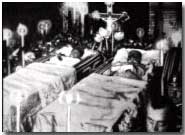 Before
we can answer that question, we must look at the official Austrian reaction
to the killing. This took two forms.
Before
we can answer that question, we must look at the official Austrian reaction
to the killing. This took two forms.
First, the police and the courts undertook a wide-ranging series of arrests and investigations. Hundreds of people were arrested or questioned, sometimes violently. Twenty-five people were finally tried and convicted, though only a few were executed, because so many of the defendants were minors.
Second, the Austrian foreign ministry and the emperor's closest advisors considered what to do about Serbia's role in the plot. Investigators quickly learned that the murder weapons came from Serbian sources, but Austrian intelligence failed to distinguish between the roles of the Pasic administration and unofficial nationalist groups: for that matter, they blamed Narodna Odbrana for the crime, apparently unaware of the Black Hand.
Austria's blame for the war attaches to its calculated response to the murders. Early councils were divided. The chief of staff, General Franz Baron Conrad von Hoetzendorf, wanted a military response from the beginning. Conrad had previously argued that the Monarchy was surrounded by enemies who needed to be defeated individually, before they could combine. In other words, he wanted a war against the Serbs and Russians, followed later by a confrontation with Italy. Leopold Count von Berchtold, the Habsburg foreign minister, generally agreed with Conrad's analysis. Berchtold took no strong position in the crisis: he was apparently convinced by Conrad, and his only hesitation involved the need to prepare public opinion for war.
The only real opposition to a policy of confrontation and war came from the Hungarian Prime Minister, Count Stephan Tisza. Tisza was personally opposed to militarism and took the risks of war more seriously than Conrad. Also, as a Magyar, Tisza realized that a Habsburg victory would be a domestic defeat for Hungarians: if Austria annexed Serbia, the delicate ethnic balance in the Dual Monarchy would be lost. Either the Slavic population of Hungary would increase, leaving the Magyars as a minority in their own country, or trialism would replace the dualist system, again discounting Magyar influence.
The early Austrian deliberations included another, calculated element that shows their limited interest in peace: in weighing the merits of a military response, Vienna first sought the reaction of her German ally. The Austrian ambassador in Berlin found that the Germans, especially Kaiser Wilhelm, supported a war to punish Serbia and offered their full support. This was in clear contrast to events during the Balkan War of 1912, when Berlin refused to back Vienna in any intervention. Like the Austrians, the Germans feared a future war with Russia, and preferred to fight at once, before their enemies grew stronger.
When the Austrian Council of Ministers met again on July 7, the majority favored war. To satisfy Tisza, the council agreed to present demands to Serbia, rather than declare war at once. In the belief that a diplomatic victory alone would not be enough to destroy Serbia as a threat, the demands were deliberately to be written in such extreme terms that Serbia could not accept them: Serbia's refusal to comply would then become the excuse for war. Within a week, Tisza himself consented to this plan: his only reservation was insistence that no Serbian territory be annexed after the war.
The final 10-point ultimatum demanded the suppression of anti-Austrian newspapers and organizations (including Narodna Odbrana), a purge of anti-Austrian teachers and officers, and the arrest of certain named offenders. Two points seriously interfered in Serbian sovereignty:
-
Austrian police would
help suppress subversives on Serbian territory, and
- Austrian courts would help to prosecute accused conspirators inside Serbia.
The document had a 48-hour deadline. The council finalized the demands on July 19 and sent them to Belgrade on the 23rd. The war party in Vienna hoped that the Serbs would fail to agree, and that this could be an excuse for war. As further evidence, the 48-hour time limit altered the document from a negotiating piece, to an ultimatum.
We can say three things about how the Austrian process of decision bears on Austria's responsibility:
-
First, the majority in
the Council of Ministers assumed from the first that war was the
appropriate response. Only Count Tisza opposed it, and he did so largely
for reasons of domestic politics. His objections were overcome by the
promise to seek no annexation of Serbia. The negotiations with Serbia were
really a sham, to create a good impression: even the 48-hour ultimatum
shows that crisis, not compromise, was the intent.
-
A second clue to
Austria's intent is Vienna's approach to Berlin, for Germany's support in
case of war. After the Berlin government responded with the so-called
"blank check," the war party saw no further reason to seek peace.
- Third, the terms of the ultimatum show that the Austrians came to a decision even though they were acting on incomplete information. The ultimatum was issued well before the trial of the assassins could establish the facts of the crime. Vienna knew nothing about the Black Hand or its role, but it made no difference: the decision for war was based on expediency, not justice or facts.
The Serb Reply
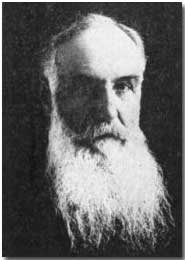 The Serbs in turn failed to
do their utmost to defuse the crisis. When Serbia first received the
ultimatum, Pasic indicated that he could accept its terms, with a few
reservations and requests for clarification.
The Serbs in turn failed to
do their utmost to defuse the crisis. When Serbia first received the
ultimatum, Pasic indicated that he could accept its terms, with a few
reservations and requests for clarification.
As time passed, however, it became clear that Russia would support Serbia regardless of the situation. After that, Pasic gave up seeking peace. While a long reply was written and sent, Serbia rejected the key points about Austrian interference in domestic judicial and police work.
Pasic knew this meant war, and the Serbian army began to mobilize even before the reply was complete. While this was prudent, it did not imply a strong commitment to peace. Because the Serbian reply did not accept every point, Austria broke off relations on July 25.
The tough positions taken by both Austria and Serbia brought the situation too close to the brink to step back, and in a few days matters were out of control. Again, the specific arguments raised by each side matter less than their mutual willingness to take risks. This policy of brinkmanship made war more likely than negotiation.
Why A Balkan War?
This leads us to the last question: why did the Balkan crisis of 1914 lead to World War I, when many other crises were resolved without a general war in Europe?
These are really two questions:
-
First, why did the crisis
lead to a war between Austria and Serbia? and
- Second, why did that conflict soon involve the rest of the Great Powers?
From what we have seen about risk taking by the Austro-Hungarians and the Serbs, we can say something about why those two states went to war in 1914.
In the first place, both governments believed their prestige and credibility were on the line, not only in the international community, but at home.
For the Austrians, a personal attack on the royal family required a strong response, especially if it involved Serbs, who had defied the Dual Monarchy during the Pig War, been labelled as traitors during the Friedjung Trial, and recently destroyed south-eastern Europe's other dynastic empire (the Ottomans). Failure to act in the summer of 1914 invited greater turmoil later.
For the Serbian regime, the humiliating Austrian terms would have undone all the progress made since 1903 in achieving independence from Habsburg meddling. The economic Pig War, Austria's annexation of Bosnia in 1908, and now the demand to send police into Serbia, all implied renewed Austrian control. In addition, Pasic and his ministers faced a real risk that right-wing extremists would kill them if they backed down.
On the international stage, both sides were one defeat away from being marginalized: Austria-Hungary had no intention of replacing the Ottoman Empire as the "Sick Man of Europe," and Serbia refused to be treated as a protectorate.
Second, in 1914 both sides believed that they were in a strong position to win if war came. The Austrians had German backing; the Serbs had promises from Russia. Neither side considered the chance that the war would spread across Europe.
Third, neither side really believed that their differences could be settled by negotiation. Only one regime could rule the South Slavs in Bosnia.
Fourth, both sides focussed on the fruits of victory, and ignored the costs of defeat. We have already discussed the Great Serb ideas that became Belgrade's war aims: annexation of Bosnia, Croatia, Vojvodina and so forth. Despite promises to Tisza that the war would bring no annexation of unwelcome Slavs, by 1916 the Vienna government drew up plans for the annexation of Serbia and Montenegro, as well as border districts in Russia and Italy, and an economic plan to make Albania and Romania into economic dependencies.
Fifth, there was too little fear of war. After the Greco-Turk war of 1897, the ethnic fighting in Macedonia, the two Balkan Wars, and the Italian war with Turkey in 1911, war in the Balkans was not unusual. A little warfare had become commonplace, a normal aspect of foreign relations. No one foresaw what the World War would mean.
In sum, too many leaders on both sides in 1914 deliberately decided to risk crisis and war, and the initial Austro-Serb combat was the result.
Finally, why was the local war between Austria and Serbia so significant that it grew into a World War? Here, we can draw inferences from what we know of the Eastern Question and past Balkan politics. An essential element of Greek, Serb and Bulgarian nationalism had always been the destruction of the Ottoman Empire: the achievement of national unity necessarily meant the achievement of Ottoman collapse.
The same choice pertained to Austria-Hungary. Concessions to Serbian nationalism could only make Vienna's problems worse, not solve them: after the South Slavs would come the Romanians, the Italians, the Czechs and Slovaks, each with their demands. Once the Habsburg Monarchy started down that road, it would inevitably disappear as a Great Power.
The potential collapse of Austria-Hungary was important not only for the Vienna government, but for Austria's German ally, for the other Great Powers, and for the balance of power system. Because the clash with Serbia in 1914 affected an issue of such magnitude, it is not surprising that all the Powers soon became involved: all of them had interests at stake. The specific steps to the World War, and the division into two sides, reflected local considerations from Poland to Belgium: but the risk of world war, and not just war, entered the equation because of the ethnic issues behind the Sarajevo crisis of 1914.
(c) 1996 Steven W. Sowards; used with permission. For additional information see https://www.lib.msu.edu/sowards/balkan/lect15.htm.
Photographs courtesy of Photos of the Great War website.
'Kitchener's Army' comprised Men recruited into the British Army a result of Lord Kitchener's appeal for volunteers.
- Did you know?
